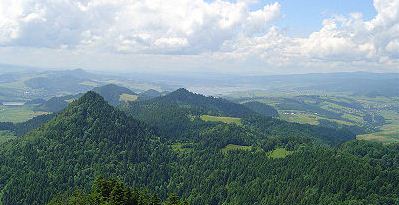Turisztikai konferencia 2011. októberében, Lengyelországban
Archív cikk; tartalmát tovább nem frissítjük, így az elavult információkat is tartalmazhat.
A világ jelentős részén a hegyi turizmus már a kultúra jól bejáratott része lett. Különösen igaz ez Európára, ahol a hegyi turizmus, mint társadalmi aktivitás már több mint 200 éves múltra tekint vissza. Ez idő alatt a hegyi turizmus életképes és erős pillére lett a kultúránknak, bár néhány formája inkább a tömegesedés és a kommercializálódás útjára lépett.
Talán ezért is tekintenek manapság a hegyi turizmusra mint rombolásra, amely kihívást jelent mind a természeti, mind a kulturális környezetre. Erről a kérdésről rendeznek októberben angol nyelvű konferenciát a szlovák-lengyel határon álló Pieniny-hegységben, testvérszervezetünk, a PTTK szervezésében. (A kép forrása: wikipedia.org)
Az alábbiakban – angol nyelven – közzétesszük a konferencia kiírását. A jelentkezési lap a csatolt dokumentumok közt található, a lap alján.
V. International Seminar on Mountain Tourism
THE CALL OF THE MOUNTAINS
What contribution has mountain tourism made to our Cultural Heritage?
organised by:
International Friends of Nature
Polish Tourist Country Lovers’ Society (PTTK) – Cracow Academic Section
Department of Tourism and Recreation, Academy of Physical Education, Cracow
In co-operation with: Pieniny National Park (Western Carpathians)
to be held in
Pieniny Mountains (Poland/Slovakia) 06 – 09 October 2011
INTRODUCTION
In many parts of the World mountain tourism has become a well-recognised aspect of the culture; certainly in Europe, mountain tourism as a social activity has a history extending back more than 200 years. During this period it has become a vital and creative force in the development of our culture but in some formats has reached mass scale and commercialisation. This is why mountain tourism is nowadays sometimes perceived as a destructive force, a challenge both for the natural and the cultural environment.
During our Seminar we want to concentrate our attention on the contribution made by mountain tourism to our respective cultures, in a variety of manifestations - including art, music, architecture, literacy, photography, tradition and environmental awareness. How should we sustain the legacy of mountain tourism, not simply as a purely physical activity, but as an enriching and educative experience for young people?
We would also like to consider the place in our culture of buildings such as mountain huts and similar structures associated with mountain tourism, many of which have accrued heritage value. Should they be protected in the same way as other cultural and natural monuments, and who ought to take on the responsibility?
These are just a few examples of questions which might arise during our meeting, and following discussion lead to formulation of a final declaration.
The objectives of the Seminar are to exchange information, experience and ideas on topics which include:
- mountain tourism and the arts;
- mountain tourist trails and huts as part of our culture;
- the relationship between the protection of cultural and natural monuments in the mountains;
- a consideration of whether or not the protection of cultural monuments linked to mountain tourism should be a goal of those charged with protecting mountainous areas;
- the role tradition should play in educating people about mountain tourism;
- the role that should be played by trusts and societies active in mountain tourism in relation to nature protection - past and present;
- new trends in mountain tourism and the evolution of protected area management;
- identifying NGOs involved with mountain tourism;
- the reasons why conflict sometimes occurs between protected area authorities and NGOs;
- case studies of positive and negative examples.
In addition the Seminar will provide participants with an opportunity to visit the cross-border National Park which protects the Polish and Slovak sectors of the Pieniny Mountains in the Western Carpathians. It is an area of exceptional bio-cultural diversity, with a long history of nature protection, and an even longer history of mountain tourism.
Participants/Audience:
The organisers invite participation from all people with an involvement or interest in mountain tourism – natural as well as cultural – parks and biosphere reserves managers responsible for tourism and environmental education, activists and managers of societies interested in mountain tourism, mountain guides, tour leaders, interpreters, rangers, scientists, writers and journalists interested in mountain issues from all over the world.
Call for papers:
Participants are kindly invited to submit papers, posters or any other kind of presentation related to the theme of the Seminar. Papers, accepted by the Editorial Committee, will be published in the post-conference Report.
Draft programme of the Seminar:
6th October
Afternoon: Arrival and registration of participants
Opening ceremony, introductory presentations.
Informal „potlach” dinner, accompanied by mountain songs.
7th October
All day: Field excursion, places connected with the history of tourism in the Pieniny Mountains and discussion of conference topics.
8th October
All day: Plenary session and discussion in working groups.
Evening: informal party.
9th October
Morning: Plenary session: reports from the working groups, general discussion, adoption of a declaration
Noon: Close of Seminar.
The working language of the Seminar will be English.
Venue: Pieniny National Park Headquarter ( 100 km south from Krakow)
The cost of the participation is 195 euro
Including: accommodation in twin room, full board, participation in sessions and field excursion, conference materials, etc.
All colleagues wishing to participate or to be informed about further details are requested to send an e-mail or fax to:
indicating: name, surname, e-mail address and represented institution/society/protected area/company/media organisation. The organisers will forward full details and a registration form.
We look forward to seeing you in Pieniny!
Dr. Christian Baumgartner – International Friends of Nature, Secretary General
Dr. Piotr Dąbrowski – PTTK, Cracow Academic Section, Commission of Nature Protection, Chairman


